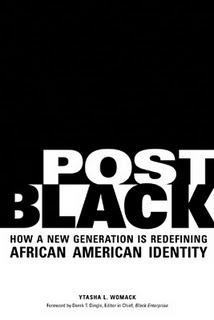Post Black: How a New Generation Is Redefining African American Identity

Post Black reads like a young, or relatively young, African American’s manifesto. Specifically speaking, it brings home points of declaration from the Generation X and Y African American crowd. Ytasha Womack thoroughly, interestingly, and comprehensibly covers the various aspects that make up the Black population in America. Some of these aspects include African immigrants, young Black professionals, hip-hop participants, and feminists.
I appreciate what Womack is not trying to do with this book, which is establish Black leadership, crucify certain Black men and women, browbeat the generations before us, and preach. There have been many writings on how Generations X and Y see the world, but few of those, if any, do so from the lens of those who have inherited slavery, the Civil Rights Movement, and institutionalized racism. When compounded by those factors, the entrepreneurial spirit that is characteristic of Generation X often affects what type of business is started, who that business caters to, and the very success of that business. The mistrust of authority that is also said to be characteristic of this generation can offer a whole new understanding when the historical basis for this mistrust is legitimate and validated on a continual basis by a society that refuses to acknowledge the historical relevance of entire groups of people. While Post Black does not blame or dwell on this historical reality, the effects are profound in how Black identities in America are shaped and molded by this reality.
Womack details not only the cultural legacy Blacks in America have inherited, but also the struggles of breaking free from the many limitations this legacy has placed on Blacks. Being bound by expected obligations of young Blacks to uphold and preserve this legacy have forced many to abandon it altogether, while others have adapted to the political, social, and economic climate of today. Womack points out that social issues that were previously ignored, dismissed, or viewed as negligible (e.g., homosexuality, feminism, and the large immigration of Africans from the African diaspora) have expanded the perceptions of what it means to be Black in America.
Womack gives a wonderful treatise on how Black is defined according to the individual experiencing it, not solely on what she thinks it is. She includes her own experiences, but uses them to explain the points and experiences she is trying to convey to those who may not understand. I understand thoroughly, because I am the product of the African and African American cultures while falling into that infamous generation known as X. Even for the reader who does not fall into a category of color, the ability to identify with what is said in Post Black should not be lost because negotiating a path that is only a handful of generations away from slavery has affected the realities of all those who have inherited its legacy.
I loved this review. It made me want to go out and buy the book immediately. It would be great if we could buy it online at FR. Does Powell deliver to Canada?